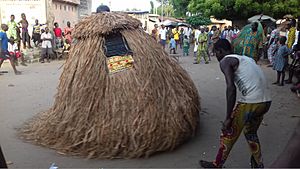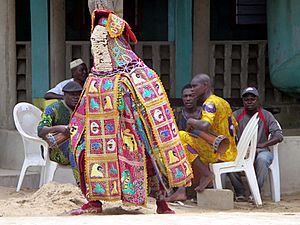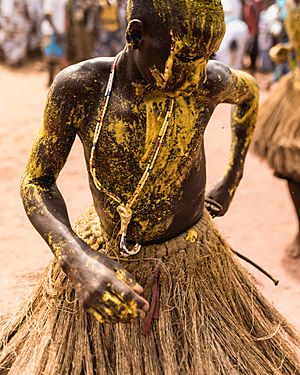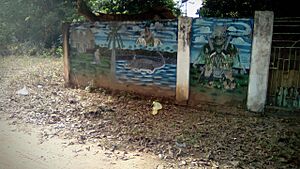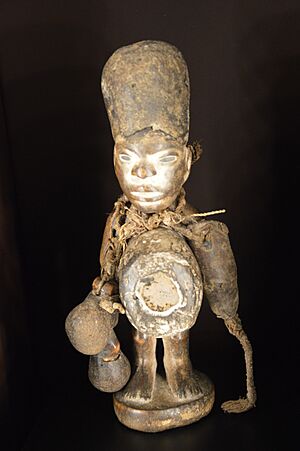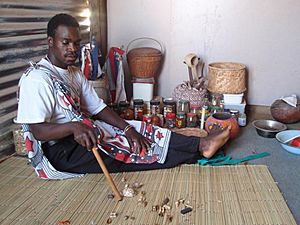African traditional religions facts for kids
Traditional African religions are the diverse beliefs and cultures of the African people. These traditions have existed for thousands of years. Unlike religions that rely on written books, African traditions are mostly oral. This means they are passed down from parents to children through stories, songs, myths, and festivals.
These religions are practiced in many countries across Africa. They include beliefs in spirits, ancestors, and often a Supreme Creator. Nature plays a very big role. Many African religions teach that humans should live in harmony with the natural world and the spiritual world.
Contents
Core Beliefs
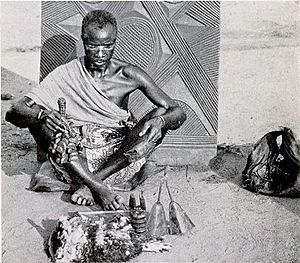
Although there are many different ethnic groups in Africa, they share some common ideas.
Spirits and Animism
A central idea in many African religions is Animism. This is the belief that everything in nature has a spirit. This includes trees, rocks, rivers, and animals. People believe these spirits can help the living if they are treated with respect.
Most traditions believe in a Supreme Being or Creator God. This God is often seen as the source of all life. Below the Supreme Being, there are many lesser gods and spirits. These spirits act as messengers between humans and the Creator. For example, the Yoruba religion has many spirits called Orisha, and the Igbo people believe in a creator named Chukwu.
Ancestors
Family is very important in African culture. This connection does not end when a person dies. The veneration of ancestors is a major part of traditional religion.
People believe that the spirits of their ancestors stay close to the family. These spirits can guide, protect, and help their living relatives. To show respect, families may offer food or drinks to the ancestors and keep their memory alive. If the ancestors are ignored, it is believed they might withdraw their protection.
The Spirit World
Followers believe in a spirit world that exists alongside the physical world. Humans, spirits, and ancestors interact constantly. Unlike some other religions that focus only on going to heaven after death, African traditions focus on living a good life here and now. However, they also believe in an afterlife where the spirit continues to exist. Some cultures, like the Serer people, believe in reincarnation, where a spirit can be born again into the same family.
Ceremonies and Practices
Religion in Africa is a way of life, not just something done once a week. It is part of daily activities, farming, and social events.
Rituals and Festivals
Communities come together for ceremonies to celebrate harvest, birth, marriage, or to ask for rain. These events often involve:
- Drumming and Dancing: Rhythm is used to connect with the spiritual world. In some ceremonies, dancers may enter a trance-like state to communicate with spirits.
- Masks: In many West and Central African cultures, people wear masks during rituals. The person wearing the mask is believed to embody a spirit or ancestor.
- Offerings: People give gifts to spirits or ancestors. This can be vegetables, cooked food, or flowers.
Divination
When people have problems or need to make big decisions, they often visit a wise person known as a diviner. This is similar to going to a counselor.
Divination is the practice of seeking knowledge from the spiritual world. A diviner might use special objects like bones, shells, stones, or wood. By looking at how these objects fall, the diviner interprets messages from the spirits. They use this wisdom to give advice on health, family issues, or the future.
Traditional Healers
Healers are important members of the community. They know a lot about plants and herbs. They use this knowledge to treat sickness. They also help with spiritual problems. In South Africa, these healers are often called Sangomas.
Important Concepts
Ubuntu
Ubuntu is a famous philosophy from Southern Africa. It is often translated as "I am because we are".
This idea teaches that a person is a person through other people. It focuses on kindness, sharing, and community. In traditional African thought, no one lives in isolation. Your actions affect everyone else. Being a good person means caring for your community and respecting others.
Virtue and Morality
Being a "good person" in traditional African religion means fulfilling your duties to your family and neighbors. Important virtues include:
- Respecting parents and elders.
- Being honest and keeping promises.
- Being brave.
- Showing hospitality to guests.
People believe that living a moral life brings blessings, while bad behavior can bring bad luck or upset the ancestors.
History and Spread
Mixing of Beliefs
Over time, Islam and Christianity spread across Africa. Today, many African people follow these religions. However, traditional beliefs did not disappear.
Many people practice a mix of religions. This is called syncretism. For example, a person might go to a Christian church or a Muslim mosque but still honor their ancestors at home. They see no conflict in doing both. They adapt the new teachings to fit their traditional culture.
African Diaspora
When African people were taken to the Americas during the Atlantic slave trade, they took their religions with them. In countries like Brazil, Cuba, Haiti, and the United States, these traditions evolved into new forms.
- Vodou (or Voodoo) in Haiti.
- Santería in Cuba.
- Candomblé in Brazil.
These religions keep many African spirits and rituals alive, often mixing them with Catholic saints.
Traditions by Region
Africa is a huge continent with thousands of ethnic groups. Here are some of the well-known traditions.
West Africa
- Akan religion (Ghana, Ivory Coast)
- Yoruba religion (Nigeria, Benin)
- Vodun (Benin, Togo, Ghana)
- Odinala (Nigeria)
- Serer religion (Senegal, Gambia)
- Dogon religion (Mali)
East Africa
- Gikuyu mythology (Kenya)
- Maasai mythology (Kenya, Tanzania)
- Somali mythology (Somalia)
- Dinka religion (South Sudan)
Central Africa
- Kongo religion (Congo)
- Bantu mythology (Central and Southern Africa)
- Mbuti mythology (Congo)
Southern Africa
- Zulu traditional religion (South Africa)
- San religion (Botswana, Namibia)
- Indigenous religion in Zimbabwe
North Africa
- Ancient Egyptian religion (Historical)
- Traditional Berber religion (North Africa)
See also
 In Spanish: Religiones tradicionales africanas para niños
In Spanish: Religiones tradicionales africanas para niños
- Folk religion
- Culture of Africa
- List of African mythological figures


